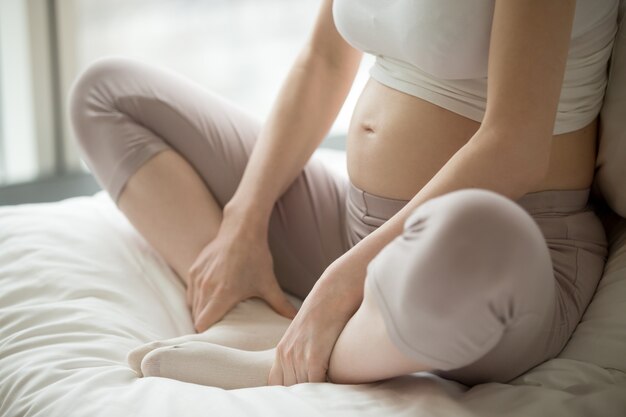
During pregnancy, many women experience physical discomfort, often including leg cramps. These cramps are quite common and typically occur as a result of the body undergoing rapid changes to accommodate the growing baby.
As your body gains extra weight and the uterus expands to make room for the baby, significant pressure is applied to the veins in your legs and calves. This can lead to swelling, pain, and cramps, especially during the second and third trimesters. The discomfort tends to worsen as the due date approaches. However, the good news is that these symptoms usually disappear after delivery. In the meantime, there are natural remedies and lifestyle changes that can help relieve the discomfort.
### Causes of Leg Cramps During Pregnancy
Leg cramps during pregnancy are caused by a combination of factors, including physical changes, nutrient deficiencies, and hormonal shifts. Below are the primary reasons for this discomfort:
1. **Uterus Expansion**
As the uterus grows during the second and third trimesters, it puts extra pressure on the nerves and veins in the legs, leading to pain and cramping.
2. **Weight Gain**
On average, pregnant women gain 8–10 kilograms, which increases the strain on the legs and calves, causing cramps. This pain is often more severe at night.
3. **Vein Stretching**
The expanding uterus stretches the veins in the legs, while the 20% increase in blood volume during pregnancy further contributes to vein pressure and discomfort.
4. **Blood Circulation Changes**
The growing uterus can obstruct normal blood flow from the legs to the heart, disrupting circulation and causing cramps.
5. **Fatigue**
Carrying additional weight often leads to exhaustion, which puts stress on the leg muscles and makes cramping more likely.
6. **Dehydration**
Pregnant women require more water due to increased body size and the baby’s developmental needs. Not drinking enough can lead to dehydration, which is a known cause of muscle cramps.
7. **Calcium and Magnesium Deficiency**
Essential nutrients like calcium and magnesium are often depleted during pregnancy, especially if medication or poor diet further reduces these minerals. The nutrients are also shared with the growing baby, which can leave the mother deficient and prone to cramps.
8. **Hormones**
Higher levels of the hormone progesterone during pregnancy can relax muscle tissues, which may contribute to leg pain. This discomfort tends to peak at night.
### Tips to Relieve Leg Cramps During Pregnancy
Although leg cramps are a natural part of pregnancy, you can take steps to minimize their impact. Here are some practical tips and remedies that may help:
#### 1. Maintain a Balanced Diet
Eating a nutritious diet is crucial to reducing leg cramps. Ensure your meals include a variety of foods rich in protein, vitamins, iron, calcium, magnesium, and potassium. Some great options include:
– Leafy greens (spinach, broccoli, cabbage)
– Nuts and seeds (almonds, pumpkin seeds)
– Protein sources (fish, eggs, beans, lean meats)
– Whole grains
– Fresh fruits (watermelon, oranges, dried apricots)
– Dairy products (milk, yogurt)
Avoid foods that are difficult to digest, like potatoes or glutinous rice, as they can lead to bloating and discomfort.
#### 2. Exercise Regularly
Gentle exercises, like walking, yoga, or simple stretching, can improve circulation and reduce cramping. Focus on stretches that target your legs and calf muscles, especially before bedtime, when cramps tend to worsen. Make sure to consult your doctor before starting any exercise routine.
#### 3. Apply Heat
A warm compress or heat pad wrapped in a thin towel can provide relief. Place it on the affected area for 10–20 minutes to ease pain and improve blood flow. Remember not to use excessively high temperatures or fall asleep with a heat pad on.
#### 4. Wear Support Stockings
Compression stockings can provide support to your legs, reduce swelling, and alleviate cramping. These stockings help maintain proper blood circulation in the legs.
#### 5. Limit Alcohol and Caffeine
Avoid alcohol entirely during pregnancy, as it can harm both you and your baby while exacerbating cramps. Similarly, reduce your intake of caffeinated drinks, as they can dehydrate your body and worsen leg cramps.
#### 6. Massage Your Legs
A gentle leg and calf massage can relax tight muscles and improve blood flow. Cold compresses or standing briefly on a cool surface can also help reduce swelling and cramping.
#### 7. Rest Your Legs
Avoid standing for long periods and give your legs regular breaks throughout the day. Also, try not to sit with crossed legs, as this can impede circulation and lead to cramping.
#### 8. Stay Hydrated
Drink plenty of water—at least 11–12 glasses a day. Staying hydrated prevents dehydration and supports healthy muscle function. Other fluids like milk and juice can also help.
#### 9. Choose Comfortable Clothing and Footwear
Wear loose clothing and avoid tight garments that might restrict blood flow. Opt for comfortable, flat footwear rather than high heels, and use slippers around the house.
#### 10. Listen to Your Body
If you feel the need to urinate, don’t delay. Holding in urine can lead to muscle stiffness and increase leg cramps. Frequent urination is a normal part of pregnancy, so respond to your body’s signals promptly.
Leg cramps are a temporary discomfort that will usually diminish after you’ve delivered your baby. By following these tips, you can alleviate their severity and frequency, ensuring a more comfortable pregnancy journey.